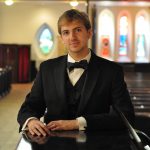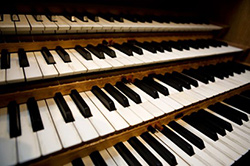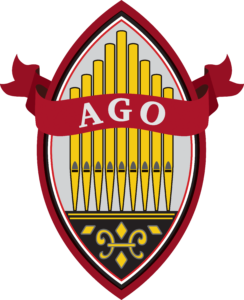
Jon Cziner and Colin Macknight were one of four student composer-organist pairs that were selected last fall for the AGO’s 2016-17 Student Commissioning Project. The project is an exercise in creative partnership over the course of the 2017-18 academic year wherein a composer and an organist are paired to collaborate on the composition and performance of a new work for the organ. Fantasy Chorale (approx. 9 minutes) was composed by Jon Cziner in spring of 2017 and premiered by Colin MacKnight.
What can you tell us about Fantasy Chorale?
Jon: I have always been fascinated by the history and majesty of the organ. With its immense size and power, the possibilities are endless. I wanted to write a piece that paid homage to the rich history of organ music, but in my own 21st century American language. My piece, Fantasy Chorale, is structured in four main sections, marked Introduction, Chorale, Scherzo, and Finale. The Introduction, while quite short, is important nonetheless as it introduces the main musical ideas and presents the main crux of the piece: a battle between the keys D♭ and C. After an ambiguous opening, the piece attempts to blossom into D♭ major foreshadowing the Chorale; however, a “fate” motto stalls this attempt, and the introduction closes mysteriously.
The chorale grows out of almost nothing. Two voices turn into three, three into four, and so on, until the final version brings in all the voices in full harmony. The “fate” motto interrupts this ever-growing bliss and the music spirals out of control directly into the meandering and mischievous Scherzo. At the end of the section we hear the chaotic scherzo material over the grand Chorale theme, which is again interrupted by “fate.”
In the Finale, the “fate” motto completely takes over the music. The very end of the piece pits D♭ major against C minor with simultaneous chords in both tonalities; however, it is C minor that wins out in the end, and the hope of a reprise of the blissful Chorale ends in tragedy.
The piece doesn’t try to depict anything in particular, but is rather an abstract piece. I was influenced by works that contain multiple sections, like Maurice Duruflé’s Prélude, Adagio, et Choral Varié sur le Thème du ‘Veni Creator’. (I even used the title “Introduction, Chorale, Scherzo, and Finale” as the working title for my piece.) I was also influenced by the Fantasias of Bach, Max Reger’s Chorale-Fantasy on Hallelujah, Gott zu loben, Op. 52, No. 3, and Percy Whitlock’s Two Fantasy Chorales, which Colin played brilliantly for me to show off both his virtuosity and the capabilities of the instrument.
Describe your composition process
As with many of my pieces, the composition process was in three steps. First, a sketching out of raw material, second, a sketching out of the piece in full draft, and a third step which involved going back and turning the full draft into a real piece. The first two steps I accomplish pretty quickly—in this case I had drafted the full draft within a week. It is the last step that takes the most time and care. It involves everything from adding and cutting measures to playing around with the form and adding details to spice up the unseasoned material.
How did your partnership with Colin work out?
Colin approached me with the idea of applying for this competition, and it was easy for me to immediately say yes. I love the instrument, I hope to write more solo organ music, and I’m already day dreaming about writing a Concerto for Organ and Orchestra. More importantly, Colin is an unbelievable player who can do almost anything. So far, the partnership has gone really well, but I say “so far” because I anticipate that 1) Colin will have more suggestions and ideas about changes and registrations, and 2) I hope to work with Colin again on many future projects!
I think Colin and I are both fans of the late romantic period, and that language certainly has had an impact on my writing. This made collaborating even easier: I could basically write whatever I wanted, knowing that Colin would have a good idea of how to interpret it.

Colin, what can you tell us about playing Fantasy Chorale?
Jon did a great job of writing the piece to be practical and playable, but it is not an easy piece. The hardest section is the scherzo because of its contrapuntal texture and quick tempo. Jon also included lots of dynamic indications so the piece requires quite a lot of button-pushing.
How was your collaboration with Jon? When I first approached Jon, I had not heard any of his music but knew that his music was strongly influenced by Romantic and Post-Romantic composers, such as Mahler and Strauss. Since that style is one of my favorites, I thought it was likely that Jon would write something I would enjoy. After I asked him if he would be interested in applying for the AGO commission, he showed me his orchestral work reAwaken, a 14 minute work for a very large orchestra. (The score was something like 70 pages!) Not only did I love the piece, but I could tell that Jon would have no problem learning how to write for the organ.
One thing that worried me a bit was that Jon wanted to submit reAwaken as his sample score for the AGO commission application. I thought this was a great idea until the AGO said that, in the interest of fairness, they could not accept a record along with the score. I worried that even the world’s most capable score-reader would not be able to get an idea of the piece while trying to read twenty-some lines of music, C-clefs, and transposing instruments. Luckily though, the AGO must have found a way around this! (I like to imagine them bringing in 5 to 10 keyboardists and assigning them each a section of the orchestra.)


